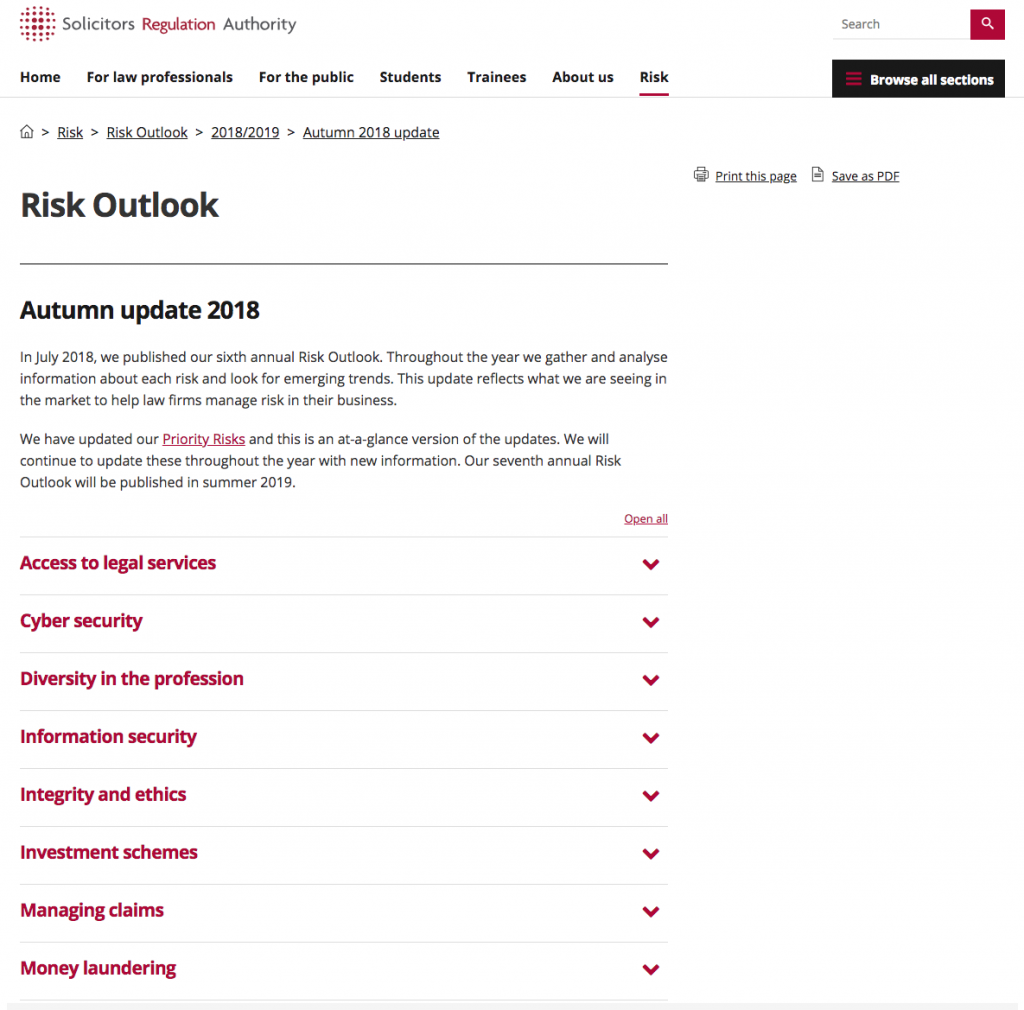Firstly a warm welcome to the new subscribers to our newsletter.
We had a mini surge in sign-ups over the past couple of weeks – perhaps that’s reflective of the raft of regulatory change that the profession is facing at the moment. Maybe it’s just loneliness. Either way, we’re glad to have you along for the journey.
This week’s theme is definitely ‘Transparency’. It’s become something of an obsession of regulators, hasn’t it? We are just 6 days away from the SRA price and service transparency rules coming into effect, which we have covered in depth over the past year or so. You can find our latest resources below.
A quick thank you to Cardiff & District Law Society, Legal Network Wales, and Legalinx for inviting me to speak at their transparency event last week (slides are here). The message we tried to get across was that, although it may be a headache, there are opportunities to use the price transparency rules to your advantage. We should be looking to communicate what value we bring, rather than concentrating solely on price, to avoid a race to the bottom.
The new rules are definitely forcing firms to think strategically about their pricing structures, what it says about their brand, and where it places them in the market.
If you are considering a price calculator for your website, you should definitely check out the Legalinx quote generator (contact here) – an elegant solution that could increase your site’s conversion rate.
Also this week, an important piece written for us by the newly formed Regulatory and Disciplinary team at Leigh Day (“SRA Investigations: be alert, be prepared”). Unless you have been asleep for the past couple of years, you will know they have vast personal experience in this area. When faced with an investigation, it’s important that firms take early advice. And you should not forget that a separate D&O policy is a must – there is no longer any cover in the minimum terms PII.
We also have put together some at-a-glance resources for those of you who may be caught by the Insurance Distribution Directive and Transparency Rules. Let us know what you think – if this format is helpful we will do more!
Have a great weekend,
P.S. Have you seen the Law Society’s new branding? I rather like it!

SRA Transparency Rules
Undoubtedly the hot topic is the SRA Transparency Rules, which come into effect on 6th December. A quick, unscientific browse of current websites suggests that not many firms are there yet. If you have left it to the last minute, don’t panic – help is at hand! See the resources below:
- Blog: SRA Transparency Rules in a Nutshell
- SRA Transparency Rules Practice Note (PDF)
- SRA Transparency Rules Checklist (PDF)
We have also worked with a number of firms on reviewing (and even drafting) their transparency pages. Please contact us for more information about our fixed fees.

Guest Post: SRA interventions: Be alert, be prepared
Few will have missed the very public Leigh Day saga. We are pleased to be able to include in this week’s newsletter an important piece from Gideon Habel which sets out what you need to do if faced with an SRA investigation.
If there is one lesson to be learned – make sure you take early advice and have the right level of insurance cover!

Insurance Distribution Directive
We have a feeling that this may have passed some firms by when it came into force on 1st October. So we have put together the following resources to help you get up to speed and comply, where necessary:

LeO considers publishing all complaint information
In line with the transparency theme of this newsletter, the Legal Ombudsman (LeO) has been reported as considering publishing full details of the decisions made in respect of complaints received.
Currently LeO only publishes information where the lawyer has been charged case fee. Such a fee is charged if LeO doesn’t agree with the remedy offered by the solicitor or that they had dealt with the complaint reasonably. The interim position is for LeO to publish decisions whereby poor service has been found.
If agreed, the new approach would be rolled out in 2020-2023.
Why it matters
Nobody likes bad publicity, so this proposal is unlikely to go down well. The regulators will say that better complaints transparency will instil greater public confidence in the system. Which is of absolutely no use when you get a black mark against your firm’s hard earned reputation.
The bigger issue though, is what happens to this data. As we know, the legal regulators are very fond of Open Data, meaning that they will make it available to anyone who asks for it. No doubt the legal comparison sites will gladly match complaints data to the price information they are able to freely obtain from firms’ own websites.
Fun game: Name another profession that has to endure this level of business intrusion.

Lord Justice Irwin calls for greater ABS transparency
Speaking at the recent Personal Injury Bar Association conference, Lord Justice Irwin took the opportunity to call for greater transparency in respect of the ultimate ownership of alternative business structures (ABSs).
Referring to the personal injury sector in particular, he voiced concerns that insurers and claims management companies can own or be involved in joint ventures with legal firms.
Why it matters
At the moment the SRA does not publish details of the full ownership structures of ABSs (although a little Companies House research is not difficult). We see little problem with there being more information about owners, but to think that most clients will be interested is ponderable.
However, the implication that there is something sinister about the ABS model itself doesn’t sit well at all.

Council ABS reporting positive results – where are the rest?
Invicta Law is an ABS set up by Kent County Council to offer legal services. It has reported positive underlying trading profits of £302,000 in its first six months of trading to 30 September 2018, according to the Gazette.
Why it matters
The possibility of using the ABS route to provide legal services doesn’t appear to have been exploited to its fullest by local authorities. The publication of positive news in this sphere may encourage other authorities to follow suit and generate income in this manner.

SRA Autumn Risk Outlook
The SRA has published its autumn update to the Risk Outlook 2018/19. It references new research which found that 60% of small business said that consideration of perceived prohibitive costs dissuaded them from instructing a solicitor.
Following the thread of our transparency theme, the research also found that small businesses bemoaned a lack of accessible online pricing.
Email modification fraud was responsible for 80% of cybercrime reports in the first three quarters of the year. Interestingly, whilst conveyancing remains a huge problem area there appears to be a shift towards other areas of work. The SRA highlights the need for firms to be vigilant and ensure that any unused internet domain names do not expire, for example following a merger or closure as criminals may attempt to re-register these and then access email histories.
The SRA has also updated its report Balancing Duties in Litigation the report comes on the back of increased publicity in respect of Non Disclosure Agreements (NDAs) and an increase in reported cases of solicitors misleading the courts. The paper warns against predatory litigation, abuse of process, misleading the court, and knowingly conducting un-winnable cases.
Reports of money laundering have also risen in the first three quarters of the year by 43%. The updated Risk Outlook references the warning notice regarding improper use of client accounts which was updated in August. Particularly helpful to law firms is the report published by the Financial Action Task Force (FATF) which looks at professional money laundering and the methods employed by criminals to launder money.
Why it matters
The SRA’s Risk Outlooks are a good source of succinct risk analysis and forecasting. It can act as an aide memoire to law firms in respect of what to keep at the forefront of their minds and the latest developments and research which can help them in the battle to remain one step ahead (or at least remain on top of things).
And what a surprise that the latest research supports the transparency agenda!

Disciplinary decisions
- Mark Lewis, high-profile media lawyer, fined £2,500 and ordered to by £10,000 in costs for “offensive” tweets.
- Robert Kearney, barrister, has been fined £1,000 for inappropriate drunken behaviour towards a pupil at a Bar Mess event.
- Luke Stephen Venton has been struck off after swearing and being abusive towards SRA staff and having three criminal convictions including drunk driving, possession of cannabis and an offensive weapon.






